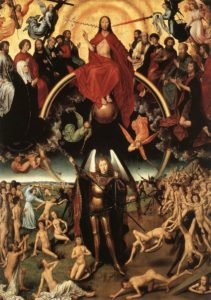On The Nature of True Liberty (4-6)
Here follows the text:
4. As the Catholic Church declares in the strongest terms the simplicity, spirituality, and immortality of the soul, so with unequalled constancy and publicity she ever also asserts its freedom. These truths she has always taught, and has sustained them as a dogma [strong word!] of faith, and whensoever heretics or innovators have attacked the liberty of man, the Church has defended it and protected this noble possession from destruction. [He means doctrinally or in its teaching. He is not claiming that never has a bishop or priest or individual Catholic impeded true liberty.] History bears witness to the energy with which she met the fury of the Manichaeans and others like them; and the earnestness with which in later years she defended human liberty at the Council of Trent, and against the followers of Jansenius, is known to all. At no time, and in no place, has she held truce with fatalism. [Fatalism is the idea that everything we do is subject to fate and, though we make the world come about as it is, there is no way it could have been other than it is now. Essentially, everything that happens is destined in fatalism and no one has freedom to act otherwise. The modern equivalent when when knowledge is limited to the modern empirical science is: determinism: there are conditions such that, given them, nothing else could happen. Leo is reminding us that we actually do have the ability to choose and aren’t forced by fate or immediate cause.]
because of most immediate empirical cause….well his parent’s did x, y and z while he was growing up which caused him to behave that way. He was determined to act that way. The empirical sciences do in fact give us the mechanical reason for actions of free beings but they do not give the teleological. The mechanical cause is necessary but not sufficient in accounting for choices (at least in my view). He continues:
5. Liberty, then, as We have said, belongs only to those who have the gift of reason or intelligence. [Animals, though they have a form of ‘intelligence’, they do not compare options, and act instinctinvely.] Considered as to its nature, it is the faculty of choosing means fitted for the end proposed, for he is master of his actions who can choose one thing out of many. Now, since everything chosen as a means is viewed as good or useful, and since good, as such, is the proper object of our desire, it follows that freedom of choice is a property of the will, or, rather, is identical with the will in so far as it has in its action the faculty of choice. [That was a lot, but he is reminding us that everything we do is seeking what we perceive as good and that seeking takes place sometimes by freely choosing something. Some we freely choose what happens other times we don’t –such as when you blink.] But the will cannot proceed to act until it is enlightened by the knowledge possessed by the intellect. In other words, the good wished by the will is necessarily good in so far as it is known by the intellect; and this the more, because in all voluntary acts choice is subsequent to a judgment upon the truth of the good presented, declaring to which good preference should be given. [We must know before we decide, otherwise its not a decision or act of free choice.] No sensible man can doubt that judgment is an act of reason, not of the will. The end, or object, both of the rational will and of its liberty is that good only which is in conformity with reason. [This is the most important sentence in the paragraph.]
The purpose of the freedom of choosing is to choose what is good. Knowing must precede freedom. That, my friend is a strong statement and most people today will react rather negatively to this because they sense they will be told what’s good for them. This aside however, the point of Pius XIII is that the knowing and choosing of what is good is the purpose of freedom, it precedes it. This is where the famous definition “Freedom is the ability to choose the good” is restated. But the most immediate reaction most people today will have to this is: Well how the hell do you know what is good? You can’t take away my freedom to do x just because you think it is not good. And then everyone just agrees to disagree and places “Freedom (license more properly defined in this instance)” above all else. But here is Leo XIII’s answer:
6. Since, however, both these faculties are imperfect, it is possible, as is often seen, that the reason should propose something which is not really good, but which has the appearance of good, and that the will should choose accordingly. For, as the possibility of error, and actual error, are defects of the mind and attest its imperfection, so the pursuit of what has a false appearance of good, though a proof of our freedom, just as a disease is a proof of our vitality, implies defect in human liberty. The will also, simply because of its dependence on the reason, no sooner desires anything contrary thereto than it abuses its freedom of choice and corrupts its very essence. [If the will chooses anything against reason, it freedom has thus been corrupted and it is not true freedom but rather something else. By the way, aren’t the secular humanists and positivists the only ones that value reason? LOL. We just include in our definition more than the mechanical cause, we include that which is good for a being as part of reason.] Thus it is that the infinitely perfect God, although supremely free, because of the supremacy of His intellect and of His essential goodness, nevertheless cannot choose evil; neither can the angels and saints, who enjoy the beatific vision. [If you are truly enlightened, you are incapable of choosing that which is not good.] St. Augustine and others urged most admirably against the Pelagians that, if the possibility of deflection from good belonged to the essence or perfection of liberty, then God, Jesus Christ, and the angels and saints, who have not this power, would have no liberty at all, or would have less liberty than man has in his state of pilgrimage and imperfection. This subject is often discussed by the Angelic Doctor [St. Thomas Aquinas] in his demonstration that the possibility of sinning is not freedom, but slavery. It will suffice to quote his subtle commentary on the words of our Lord: “Whosoever committeth sin is the slave of sin.”(3) “Everything,” he says, “is that which belongs to it a naturally. When, therefore, it acts through a power outside itself, it does not act of itself, but through another, that is, as a slave. But man is by nature rational. When, therefore, he acts according to reason, he acts of himself and according to his free will; and this is liberty. Whereas, when he sins, he acts in opposition to reason, is moved by another, and is the victim of foreign misapprehensions. Therefore, `Whosoever committeth sin is the slave of sin.’ “(4) Even the heathen philosophers clearly recognized this truth, especially they who held that the wise man alone is free; and by the term “wise man” was meant, as is well known, the man trained to live in accordance with his nature, that is, in justice and virtue.
Reason is living in accordance with nature, your nature and other’s. Our nature, as created by God is to pursue that which is good, as previously stated. It is irrational and unreasonable to, for example, drink poison, because it is not in accordance with our own good, it does not perfect us and is not part of our purpose. Yes, I said it is unreasonable. That is a peice of reasoning that is not empirically scientific because all that empirical science will tell you is that it will kill you. However, reason does dictate that the good is that which must be pursued. So also, those things (which the Pope is implying are the dictates of reason found in natural law—that are ooooh so controversial today because they impede my license to do whatever I want) which ought to be chosen are part of true freedom and their opposites are not. Now obviously I cannot now get into why these things are reasonable here…because well that basically requires expounding on way too many topics. But we can stick with explaining freedom as understood in Libertas. Until next time…
Don’t forget to use the social buttons below…




